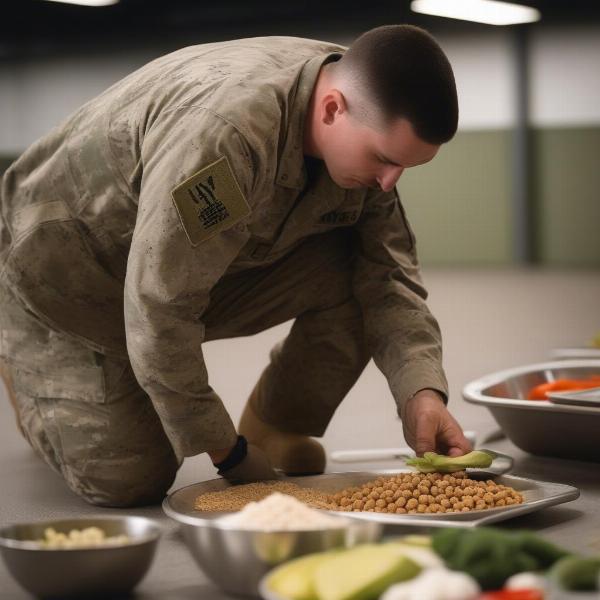The term “war dog karnivore” often conjures images of ferocious canines bred solely for combat, fueled by a strictly meat-based diet. However, this notion requires clarification. While war dogs undoubtedly play crucial roles in military operations, their dietary needs align with those of other working dogs, not necessarily obligate carnivores. Understanding the nutritional requirements of these brave animals is essential for maintaining their health and effectiveness. This article delves into the realities of war dog diets, debunking myths and providing evidence-based information.
Military working dogs, often referred to as war dogs, perform various tasks, from detecting explosives and narcotics to apprehending suspects and providing security. These highly trained canines endure rigorous physical demands and require a balanced diet to maintain optimal performance. While the perception of a “karnivore” diet might suggest a purely meat-based regimen, the reality is more nuanced. Modern canine nutrition emphasizes a balanced approach, incorporating proteins, fats, carbohydrates, vitamins, and minerals.
The Nutritional Needs of Working Dogs
Like all dogs, war dogs require a diet rich in high-quality protein to support muscle growth and repair. However, this doesn’t equate to an exclusive meat diet. While meat provides essential amino acids, a balanced diet also incorporates carbohydrates for energy and fiber for digestive health. Furthermore, essential fatty acids, vitamins, and minerals are crucial for maintaining overall health, including immune function and cognitive performance.
Debunking the “Karnivore” Myth
The term “karnivore” often leads to misconceptions about canine dietary needs. While dogs are classified as carnivores, their digestive systems have evolved to process a variety of food sources. This adaptability allows them to thrive on a balanced diet that includes both animal and plant-based ingredients. Feeding a strictly meat-based diet can lead to nutritional deficiencies and health issues.
The Importance of Balanced Nutrition
A balanced diet for a war dog should prioritize high-quality protein sources, such as chicken, beef, or fish, but also include healthy carbohydrates like brown rice or sweet potatoes. Adding fruits and vegetables in moderation can provide essential vitamins and antioxidants. Consulting with a veterinary nutritionist can help tailor a diet specifically to the individual dog’s needs, breed, age, and activity level.
 War Dog Nutrition
War Dog Nutrition
Choosing the Right Food for a War Dog
When selecting food for a war dog, consider factors such as age, activity level, and any specific health concerns. Look for high-quality commercial dog food formulated for active or working breeds. These formulas typically contain higher protein and fat content to meet the increased energy demands.
Commercial vs. Homemade Diets
While homemade diets offer control over ingredients, they require careful planning to ensure nutritional balance. Commercial dog foods are often a more convenient and reliable option, as they are formulated to meet specific nutritional requirements. Always choose a reputable brand that adheres to strict quality control standards.
Conclusion
The term “war dog karnivore” is somewhat misleading. While war dogs require a diet rich in protein to fuel their demanding work, their nutritional needs are best met through a balanced approach, not a strictly meat-based diet. Prioritizing high-quality protein sources, healthy carbohydrates, essential fatty acids, vitamins, and minerals is crucial for maintaining their health, performance, and longevity. Consulting with a veterinary nutritionist is recommended to develop an individualized feeding plan.
FAQ
- What is the best diet for a war dog? A balanced diet with high-quality protein, healthy carbohydrates, and essential nutrients.
- Can war dogs eat a strictly meat-based diet? No, a balanced diet is crucial for their overall health.
- Should I consult a vet about my war dog’s diet? Yes, a veterinary nutritionist can help tailor a diet specific to your dog’s needs.
- What are the signs of nutritional deficiency in a war dog? Lethargy, weight loss, poor coat condition, and decreased performance.
- Are commercial dog foods suitable for war dogs? Yes, high-quality commercial foods formulated for active breeds are a good option.
- Can I feed my war dog a homemade diet? Yes, but careful planning is essential to ensure nutritional balance.
- What are the key nutrients for a working dog? Protein, carbohydrates, fats, vitamins, and minerals.
ILM Dog is your trusted source for comprehensive information on dog care and well-being. We offer expert advice on breed selection, health care, training, nutrition, grooming, and much more. Whether you’re a seasoned dog owner or just starting your journey, ILM Dog provides valuable resources to help you provide the best possible care for your canine companion. Contact us at [email protected] or +44 20-3965-8624. Visit ILM Dog today for expert advice and personalized support.